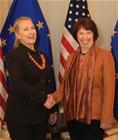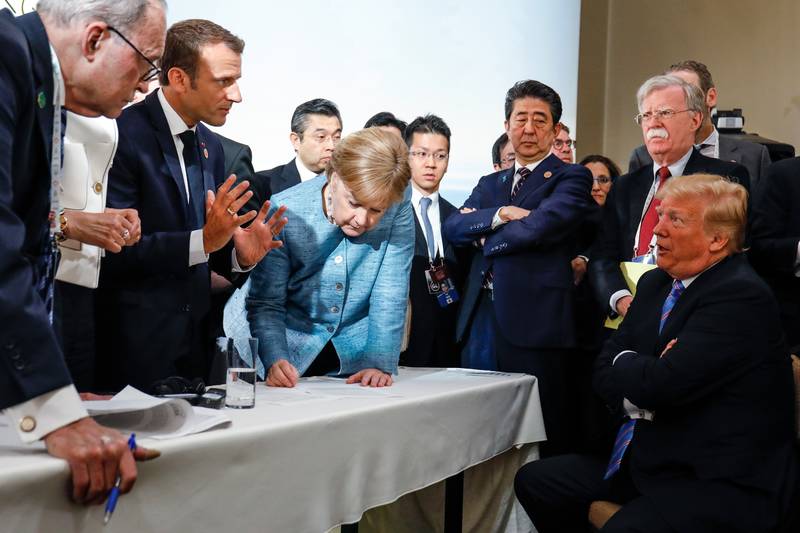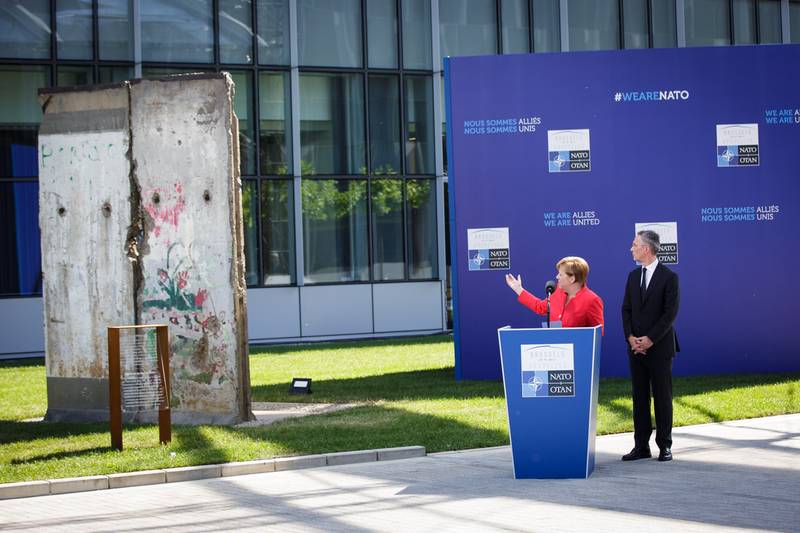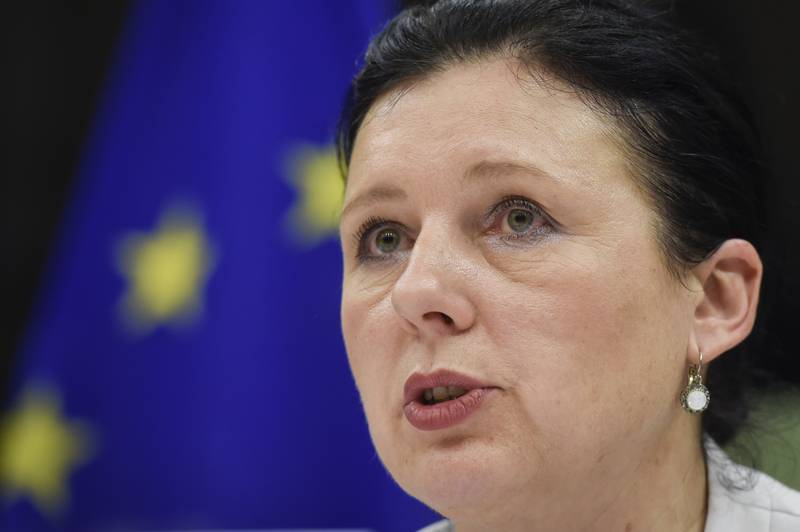Europe in the Real World
Adelina Marini, December 5, 2012
 For years the United States have been calling on Europe to stop relying on American military power and to start taking care of its own security and foreign policy. A number of European politicians made similar appeals through the years, but the results today are again a turning introvert because of the eurozone crisis European Union with something of a common foreign policy, but more likely a single voice (baroness Ashton), and a lack of common defence policy. And this is more and more turning into a problem, especially given the shift of the Washington's foreign policy priorities, announced in the beginning of the year in a new strategy with which the US is focusing mainly on the Pacific region and Asia. The need the EU to emancipate from the US's wing increased briefly during the two terms of George W. Bush when some EU member states expressed their disagreement with the bellicosity of his foreign policy.
For years the United States have been calling on Europe to stop relying on American military power and to start taking care of its own security and foreign policy. A number of European politicians made similar appeals through the years, but the results today are again a turning introvert because of the eurozone crisis European Union with something of a common foreign policy, but more likely a single voice (baroness Ashton), and a lack of common defence policy. And this is more and more turning into a problem, especially given the shift of the Washington's foreign policy priorities, announced in the beginning of the year in a new strategy with which the US is focusing mainly on the Pacific region and Asia. The need the EU to emancipate from the US's wing increased briefly during the two terms of George W. Bush when some EU member states expressed their disagreement with the bellicosity of his foreign policy.
With Barack Obama entering the White House in 2008, however, the  Europeans as if felt relieved. But the problem is, as the experts of the European Council on Foreign Relations (ECFR), among which the director of the ECFR Sofia office Dimitar Bechev, in their analysis "Time to Grow Up: What Obama's Re-election Means for Europe", that especially during his second term Obama's policy will not be the same. Not only because it will not be led by Hillary Clinton who worked quite well with EU's Lady Ashton, but also because austerity will be a milestone of the foreign policy decisions in Washington. An exception from the new era of "low cost" foreign policy, as the ECFR analysts put it, will be the return to Asia.
Europeans as if felt relieved. But the problem is, as the experts of the European Council on Foreign Relations (ECFR), among which the director of the ECFR Sofia office Dimitar Bechev, in their analysis "Time to Grow Up: What Obama's Re-election Means for Europe", that especially during his second term Obama's policy will not be the same. Not only because it will not be led by Hillary Clinton who worked quite well with EU's Lady Ashton, but also because austerity will be a milestone of the foreign policy decisions in Washington. An exception from the new era of "low cost" foreign policy, as the ECFR analysts put it, will be the return to Asia.
And although the Europeans like Obama and if they could they would have voted for him, what is hardly realised is that he is a pragmatic. This means that he already has limited patience for a European partner that is more often interested in the process rather than in the outcome and who demonstrates a lack of political will to use its significant potential. Obama's more universal approach also means that he is stopping to consider the West as a strategic unit of shared values. Brussels should also be aware that the transition from large-scale wars to continuing and developing the usage of drones and small targeted operations means that the significance of the American-European military cooperation is diminishing.
 This, translated, means that the EU will have to take care by itself of the logistics because until recently the US provided the larger share of equipment and personnel in military operations around the world. The problem, however, is that while trying to solve the eurocrisis, the EU is possible to split into two or more tiers which will make unification of the foreign policy even harder. As a result, the authors of the analysis believe, the European power is too diffuse to be much of a help. "Europe must grow up and develop the capacity to defend its own interests, because the day is fast approaching when others will be less able and willing to do this for us than they once were", are the words of former German Foreign Minister Joschka Fischer, quoted in the ECFR analysis.
This, translated, means that the EU will have to take care by itself of the logistics because until recently the US provided the larger share of equipment and personnel in military operations around the world. The problem, however, is that while trying to solve the eurocrisis, the EU is possible to split into two or more tiers which will make unification of the foreign policy even harder. As a result, the authors of the analysis believe, the European power is too diffuse to be much of a help. "Europe must grow up and develop the capacity to defend its own interests, because the day is fast approaching when others will be less able and willing to do this for us than they once were", are the words of former German Foreign Minister Joschka Fischer, quoted in the ECFR analysis.
"At the same time, our transatlantic partnership has arrived at a critical moment. Decisions we’ll soon face about our shared economic interests will determine how well we can thrive together in the years to come", said for her part US Secretary of State Hillary Clinton last week in a speech in the Brookings Institution, which can be defined as a farewell speech for Europe because Mrs Clinton is quitting active politics and this month she made her 38th and last visit in her capacity as a secretary of state to Europe. She started with the words that she must be very frank and she was. At the moment, she said, Washington is preparing for another round of budget negotiations. In spite of  the differences between the political parties, however, she assured, the US is determined to defend its global leadership and to enhance its national security. "And we are counting on Europe to do the same".
the differences between the political parties, however, she assured, the US is determined to defend its global leadership and to enhance its national security. "And we are counting on Europe to do the same".
The eurozone crisis, however, is a problem, according to Hillary Clinton, and although for the US this is a European matter which requires European solutions, "it’s vital to the entire global economy that European leaders move toward policies that promote credible and sustainable growth and create jobs". Because, Clinton explained, at the moment, the size of the economy is as important as the size of the army to measure the global influence of a country. By the way, she quoted in her speech several numbers that are very telling. During the NATO operation in Kosovo, US dropped almost 90% of the precision guided munitions, while the allies (meaning the EU) contributed by 10%. In the case of Libya, she pointed out, it was the other way round.
Clinton's speech is indicative for the shift of priorities and is another call the EU to take its foreign and defence policy in its own hands, the common policy however. The US will probably be drawn back to the Middle East where the situation has become tense again with the inflammation of the Israeli-Palestinian conflict, but in general the immediate neighbourhood of the EU, including the Caucasus, Russia, North Africa and the Middle East, will remain a European responsibility. ECFR believes that this is rather an opportunity then a reason to dramatise. The analysts with the council recommend the EU to change approach and to take advantage of its neighbours with growing influence - Russia and Turkey - by launching a security initiative. Such an initiative could contain three elements, the analysts believe.
The first is Europe not to wait more but to engage more actively with the existing and deserving trust domestic opposition in Syria by beginning to provide them direct aid. Europe should also prepare for the moment when the negotiations on a deal begin. If Europe wants to have diplomatic weight this means it should start being less squeamish and begin re-establishing the channels into the Assad regime and start talking about a solution to the problem instead of continuing teaching lessons to key countries in the region.
Secondly, Europe should take the lead in the negotiations on Iran's nuclear programme as instead of military options it pursues initiatives that will help buying time through partial and immediate lift of sanctions in exchange for verifiable suspension of 20 percent enrichment of uranium.
And the third recommendation is Europe to do more to demonstrate that it plays its role in the developments in its southern neighbourhood. It is ever clearer that given the crisis the EU will not be able to develop a 'Marshall' plan for post-revolutionary North Africa, of which insisted former Italian Foreign Minister Franco Frattini, but it could enhance its strategic dialogue with the new democracies in the region, in the Gulf, Turkey and the rest as well, with the aim to ensure closer integration of North Africa and to secure progress on large economic projects of mutual interest.
 And at a later stage, the analysts recommend the launch of debates in Europe on a strategic review. A failure to wake up, the ECFR analysts warn, will ensure that the coming presidency will be seen as the one during which America finally gave up on Europe.
And at a later stage, the analysts recommend the launch of debates in Europe on a strategic review. A failure to wake up, the ECFR analysts warn, will ensure that the coming presidency will be seen as the one during which America finally gave up on Europe.
The ECFR recommendations and Hillary Clinton's messages lead to thinking that the situation is repeating itself - a situation in which the EU was so absorbed by its own institutional building that it squandered almost 10 years for a treaty that did not even bring the adequate for the 21st century solutions, but instead led to the EU sleep over globalisation and its place in it. Now the Union is again facing an institutional stupor and a need for architectural changes. It is high time the EU to leave wonderland and to enter the real world. The crisis is not an obstacle to do this, on the contrary - it is an opportunity foreign and defence policy to finally be united in order to save costs. Alas, in a disappointing direction are going the negotiations on the next EU budget for the period 2014-2020 where precisely spending on foreign policy is proposed to be cut to give more subsidies for the farmers.
 Macron, Merkel, Abe, Trump | © Council of the EU
Macron, Merkel, Abe, Trump | © Council of the EU Angela Merkel | © Bundesregierung
Angela Merkel | © Bundesregierung Vera Jourova | © European Parliament
Vera Jourova | © European Parliament